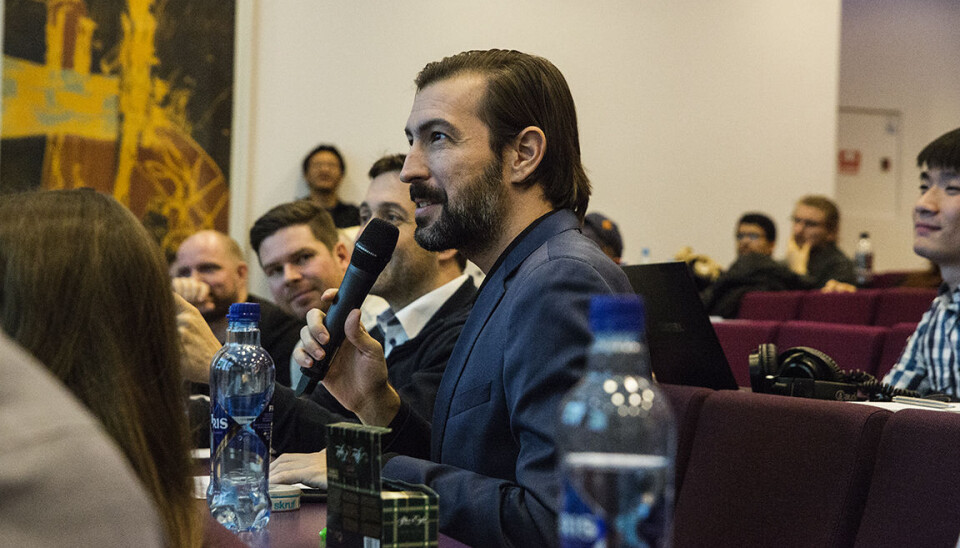Sean Percival er ikke mikrofonredd, og har vært speaker og konferansier på en rekke events under sitt opphold i Norge.
Ask an Investor: What should I do if I hate my co-founder?
Kommentar
Sean Percival is an American investor and entrepreneur with investments in over 120 early-stage startups. Formerly a partner at 500 Startups, today he works with X2 Labs, in Stavanger, and several startups in Oslo. Here, on Shifter he gives candid answers to common founder questions.
It was an early Monday morning when a flustered founder was sitting in my office waiting for me. You see in this industry Monday is often a bad-news day. That's usually when a founder or startup breakdown moment finally hits the wall. An eruption takes place the week before and, after thinking about it over the weekend, it's time to address the issue.
This morning the founder wasn't looking very talkative. When he finally did speak, he simply said "I think I hate my co-founder, what should I do?"
Oh boy.
Let's get to that in a minute, brave founder. First, I need a coffee.
When you invest in a lot of startups, your job starts to feels like half mentor, half marriage counselor. You are almost guaranteed to have at least one company in your portfolio in great distress. In many cases, this is due to a founder conflict, which in the worst cases leads to a founder breakup. This can be a catastrophic blow to a young startup, so naturally all parties involved try to avoid it. But what should you do if you're sitting across the table from your co-founder and hating every moment of it?
Starting off right
A lot of the co-founder conflicts I see start with a dispute over company ownership and compensation. In the beginning, you don't have much, so you might overpromise or not clearly define the equity structure of the company. This can become a big problem down the road, especially if your company starts to do really well.
So it's incredibly important to define the founder's ownership structure and document it. While Norway is a country of trust, in business it's always better to get something papered up and signed as well. Then everyone is on the same page (literally) and future conflicts can be avoided.
Worth giving another chance?
Before you try to dump a co-founder, give yourself another chance to correct things and develop a better relationship. Start with these questions:
- Are your individual roles well-defined and do they avoid overlap of duties?
- Is the conflict because you're both trying to "be the boss"?
- Is one co-founder no longer pulling his or her weight?
- When and why did communication start to break down?
Have an honest look at things and an honest conversation with your co-founder first. Take a few shots of Akvavit if you need some liquid courage to have what investors call a "big boy/big girl conversation." This is part of being a founder, so get used to it. You're going to have to resolve many conflicts throughout the lifetime of your company. It's a tough part of the job, but afterwards you'll feel much better, I promise.
It's too late; we're done.
If the relationship cannot be salvaged, then it's always better to take care of things sooner rather than later. Time spent with a dysfunctional partnership is going to drag your business down like an anchor. Worse, you're likely to come to the same conclusion down the road anyway. So, it's better to be done and move on.
If you have investors and board members, get their advice first on how to best handle the situation. They are likely to have some personal experience and are the best informed on the existing team dynamics. Also, since this represents a material change to the team, they should be among the first to know. There's one thing investors really don't like to be surprised about and that's major team members leaving.
See if you can work out a civil arrangement with the co-founder who is going to step aside. This will sometimes include vesting their stock options and/or repaying personal loans into the business. If you are one or two years into the business, the co-founder is due something for his or her contribution. So, better to be generous here and keep people happy.
This is another reason why it's important to define the equity between co-founders and the vesting schedule early on. In Silicon Valley, we like to see a four-year vesting schedule with a one-year cliff and monthly vesting after that. So if a co-founder is there for two years, he or she gets 50% of his or her stock on the way out.
What happens after?
Breaking up is hard to do and there's likely to be a mourning period for you both. Remember it's not personal. It's just business. You may hate each other now, but you might find yourself giving things another chance in the future. Time heals all wounds, even in startupland. In the meantime, it's totally acceptable to give each other death stares at MESH while drinking a latte, pinkie up for all the haters out there.
Other articles from Sean Percival:
Ask an investor: Why is no one investing in my startup
Ask an investor: How much should I pay myself as founder?
Shifter er Norges nettavis for startups og innovasjon. Følg oss på Facebook og Twitter. Og meld deg på nyhetsbrevet vårt.
Hør for øvrig også vår seneste Podcast, med Marianne Bratt Ricketts i Vibbio. Om hvordan hun og Stine Norum bygde et solid selskap i Norge på rekordtid og nå satser internasjonalt. I podcasten forteller hun hvordan Vibbio skal gå fra å være en videoprodusent til å bli et stadig tyngre techselskap – som blant annet bruker avansert plattformteknologi og kunstig intelligens i produksjonslinjen. Ellers om kostskolen, 18-timers-dagene i London, evakuering av landsbyer i Alpene, om å miste noen, om å ha perspektiver og beholde roen i kritiske situasjoner. Og gründertips, gründertips, gründertips!
Last ned podcasten i iTunes / Podcaster på iphonen eller bruk din foretrukne podcast-klient på Android. Søk på «Shifter».











